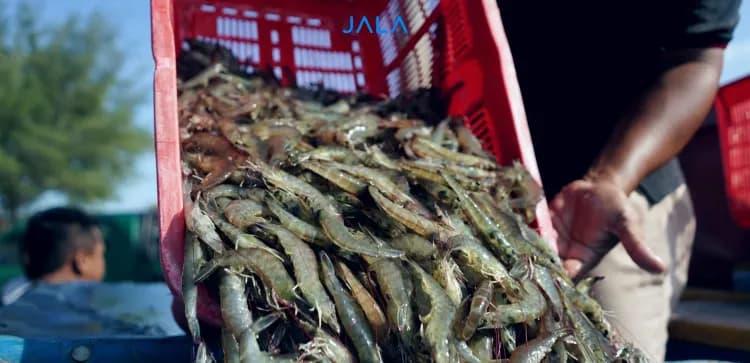
Anti-dumping and countervailing are two issues that are widely discussed by Indonesian shrimp industry actors. These two issues are believed to cause the decline in shrimp prices. What exactly are anti-dumping and countervailing?
Dumping in international trade
Dumping is the practice conducted by producers or exporters from a country to sell goods at a lower price on the international market (exports) than the domestic market. Dumping aims to dominate the market and eliminate competitors in the export destination country.
Dumping practices can jeopardize domestic producers and the economy while threatening economic sovereignty in a country. In other words, dumping can refer to the practice of an exporting country’s government giving subsidies to domestic producers to sell goods on the international market to make the prices significantly lower than the export destination country. This practice is prohibited in international trade regulations since it may disrupt the prices and markets in a country.
Anti-dumping definition
Anti-dumping is a measure to oppose dumping practices since it will lead to price discrimination and an unhealthy trade environment. A country may propose an anti-dumping movement by establishing general regulations, specifically setting quota limitations or additional charges (import tariff). This regulation, which is a part of the trade defense mechanism, is established to maintain price stability for domestic products.
Anti-dumping also serves as a measure to reduce the impact of losses due to dumping practices. In general, dumping practices are considered legal as long as they do not harm the economy of the country that becomes the target market of the goods. Anti dumping policies are issued in international legal instruments, the World Trade Organization (WTO), to resolve dumping disputes and address losses resulting from this practice in destination countries.
In practice, entrepreneurs or business associations in a country can file a complaint about a product that is allegedly “dumped”, meaning that the product is sold below the cost of its production. To compensate for the economic impact, the implementation of import tariffs is proposed according to the percentage of dumping committed by the exporting country.
Countervailing duty definition
Countervailing duty can be defined as an action to counter subsidies, it is a trade instrument in the form of import tariff issued to compensate for domestic industry losses in the importing country due to imports of goods funded by subsidies according to the investigation results.
Dumping allegations and countervailing duty to Indonesia in 2012
On December 28, 2012 COGSI (Coalition of Gulf Shrimp Industries), a coalition of entrepreneurs and fishermen from the United States (US) coastal states submitted a petition to the US-International Trade Commission (USITC) and US-Department of Commerce (US-DOC). In the petition, COGSI requested a Countervailing Duties (CVD) investigation on the import of frozen shrimp products from seven countries, namely China, Ecuador, India, Indonesia, Malaysia, Thailand, and Vietnam due to an indication of subsidies from the governments of each country.
The Indonesian government was alleged to have allocated US$ 3 billion subsidies to the fisheries sector for 5 (five) years to increase the shrimp production target by 18-19% per year from 2010 to 2014. The aforementioned subsidies were allegedly given through the provision of export credits, export insurance, tax incentives, and import tariffs on capital goods used for exports to the US, as well as exemption of value added tax (VAT) on capital goods used for exports.
The Indonesian government had responded to these charges by not keeping quiet. The program led by the Ministry of Maritime Affairs and Fisheries annually disburses funds to empower people who cultivate shrimp. However, it aims to maintain national food security instead of the commercial purpose of providing subsidies to exporters, as was previously alleged.
At that time, the settlement carried out by Indonesia and the US was bilateral, and this case had not yet reached the settlement stage by the WTO’s Dispute Settlement Body. Out of all the allegations brought against the Indonesian government through investigations and existing trade diplomacy measures, Indonesia had finally succeeded in proving that its shrimp products were not subject to allegations of subsidies.
The final decision announced by US-DOC on August 13, 2013 stated that the result of Countervailing Duty on shrimp imports from Indonesia was negative. This was based on the final subsidy rate regulations imposed was below 2% or de minimis on PT Central Pertiwi Bahari and PT First Marine Seafoods, which are 0.23% and 0.27% respectively.
Anti-Dumping Duties (ADD) Petition in 2023
On October 25, 2023, the American Shrimp Processors Association (ASPA) filed an anti-dumping duties (ADD) petition against frozen shrimp imports from Ecuador and Indonesia. ADD's petition states that frozen shrimp imports from Ecuador and Indonesia that are sold in the US at a price lower than fair market are deemed as "dumped." ASPA requested that Ecuador and Indonesia be subject to anti-dumping duties, which would entail import tariffs of around 111.4% and 37.36%, respectively.
ASPA also filed a countervailing duties (CVD) petition or petition to address subsidies for frozen shrimp from Ecuador, India, Indonesia, and Vietnam. The CVD petition states that the governments of Ecuador, India, Indonesia, and Vietnam provide remediable subsidies for the production and export of frozen warm water shrimp.
Are ADD and CVD Petitions exaggerating?
Anti-dumping and countervailing duties are forms of protection for domestic industry, and it is very reasonable for a country to issue them with the aim of balancing injustice in trade. When products are exported to the US at a price below fair market value, they can be sued for anti-dumping tariffs. This helps protect the industry from unfair competition and ensures equality of opportunity for domestic producers.
The US-DOC will decide whether frozen shrimp imports from these countries are dumped in the US and determine what anti-dumping charges should be applied. Additionally, DOC will determine whether Ecuador, India, Indonesia, and Vietnam governments subsidize frozen shrimp exports to the US. The International Trade Commission (ITC) will also be involved in deciding the status of imports of specific goods that materially harm or threaten to impair the importing country’s industry.
After the ITC vote, both the association and the US-DOC will conduct investigations. The vote validates data in the ASPA petition, which shows that imports from Ecuador, India, Indonesia, and Vietnam have taken market share from domestic producers, caused significant price decline, and caused serious losses for domestic shrimp processors and fishermen.
During the process, the US-DOC will issue a questionnaire to shrimp producers and/or exporters. The questionnaire is a tool used by the Department of Commerce to collect information from producers of commodities under investigation to investigate allegations of dumping or subsidies. In a CVD investigation, a questionnaire will also be issued to the government of the exporting country that is subject to the investigation. All involved parties will have the chance to submit factual information and arguments on the case brief for consideration by the Department of Commerce. As mandated by law, the Department of Commerce will issue a preliminary decision within 140 days after the beginning of AD investigation and 65 days after the beginning of CVD investigation. This time limit may be extended under certain circumstances.
What is the impact of dumping in the shrimp industry?
The Indonesian shrimp industry has been severely impacted by dumping allegations. In the case of shrimp product exports to the US, buyers from the US give provisions for exporters requiring 30% of the sales earnings be retained. This means that the exporters only receive 70% of the earnings until the decision of dumping claim as an anti-dumping is proven. It has a significant effect on the Indonesian shrimp export industry because the US market accounts for 70% of Indonesia’s total exports.
Exporters pass on some of this matter to producers, resulting in declining shrimp prices. The decline in shrimp prices causes producers to temporarily stop producing shrimp. This is because it considers the risk factors, which tend to be high if production activities are continued.
In response to this dumping case, the government through the Ministry of Trade, the Ministry of Maritime Affairs and Fisheries, and AP5I held an Anti-Dumping and Anti-Subsidies Investigation Petitions Discussion Meeting to address the issued petitions.
Indonesia's commitment to compete fairly in the global shrimp stage
Indonesia has complied with the Anti-Dumping Agreement regulated by WTO by ratifying the WTO Establishment Agreement. Indonesia has automatically ratified the 1994 Anti-Dumping Code which is found in the agreement. As a consequence of the WTO Establishment Arrangement ratification by Indonesia, the country enacted fundamental provisions regarding anti-dumping which were accommodated in the Act No. 10 of 1995 regarding “Customs”. By doing this, Indonesia participates in the international framework to address dumping practices and protect domestic industries from unfair competition.

Being one of the world’s top shrimp producers, Indonesia always seeks to contribute to meeting the global demand for shrimp while complying with the regulations and competing fairly with other shrimp producers such as Ecuador, India, and Vietnam. In addition, the commitment to production is balanced with the implementation of food safety and sustainability to ensure that the goods produced support both human health and the earth where we live on.
Sources:
Campbell, J. C., Kepkay, A., & Castillo, A. (2023). Information regarding the antidumping and countervailing duty petitions on frozen warmwater shrimp from Ecuador, India, Indonesia, and Vietnam. White & Case. https://www.whitecase.com/insight-alert/information-regarding-antidumping-and-countervailing-duty-petitions-frozen-warmwater
Initiation of AD and CVD investigations of frozen warmwater shrimp from multiple countries. International Trade Administration | Trade.gov. (n.d.). https://www.trade.gov/initiation-ad-and-cvd-investigations-frozen-warmwater-shrimp-multiple-countries
Simangunsong, G. A. (2022). Penyelesaian Sengketa Bisnis Ekspor Udang Indonesia dan Amerika Serikat. Jurnal Rechten: Riset Hukum Dan Hak Asasi Manusia, 4(1), 1–7. https://doi.org/10.52005/rechten.v4i1.71
Strout, N. (2023). US International Trade Commission gives green light to shrimp import investigation. SeafoodSource. https://www.seafoodsource.com/news/supply-trade/us-international-trade-commission-gives-green-light-to-shrimp-import-investigation




